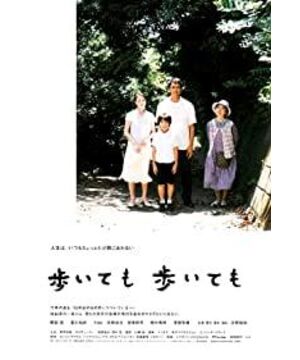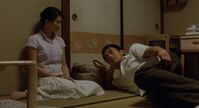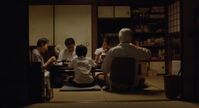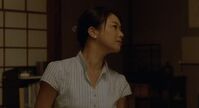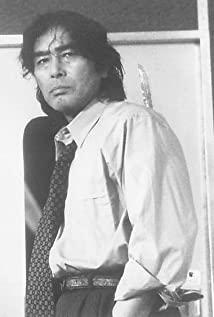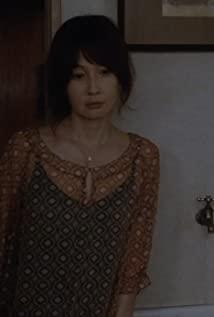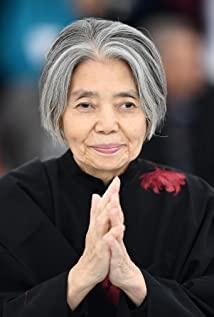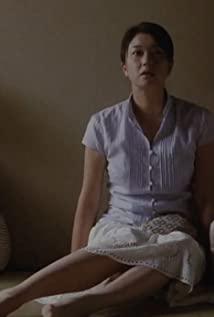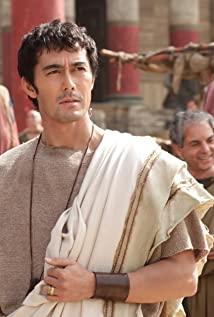In such a lively family, the only discordant voice is the retired doctor's father Yokoyama Kyouhei (Yoshio Harada). The old man's temper is stinky and hard, and it's good to die. No matter how stubborn, he ran out to eat as soon as he smelled the smell of tacos; although he said in front of Yuka that it would be more difficult to remarry with children, he kindly gave Houji pocket money and encouraged persuasion with temptation. Atsushi, who became a piano tuner, will become a doctor in the future.
In fact, not only the father of the Hengshan family, but every character of the Hengshan family is extremely plump, and there are small details of one kind or another that make them rough and delicate, hard and soft, which makes them unbearable and makes them extremely intimate and cute. For example, the mother is very stingy when she chats with her daughter in private. She doesn't look down on Yukali, who is dragged in by the widow, but she is willing to give her her precious kimono, and she also knows how to prepare toothbrushes and towels for her non-natural grandson, Atsushi. Another example is the daughter Qian Nami, although she always persuades this and the other like a boss, but when she left, she and her husband chatted in the car and complained that her parents favored the dead brother. And many of Abe Hiroyuki's characters think that their mother is too long-winded and troublesome, and their father is unreasonable and unreasonable, but they will obediently put on the cheap pajamas bought by their mother "from the train station stall" and secretly be proud of themselves, even when they are unemployed and struggling. Under these circumstances, he secretly gave his mother pocket money; however, he still seldom called home, and could not understand the deep concern hidden by the elderly.
This kind of non-communication and small misunderstandings between relatives are often trivial matters that are not worth mentioning. A lot of dissatisfaction just passed, a lot of small bumps quietly formed, a lot of trivial things that I wanted to say were eventually forgotten, and stumbling and stumbling unconsciously is a lifetime. This ordinary day in the Yokoyama family is actually the epitome of the whole life. Laughter and sadness coexist, satisfaction and regret go hand in hand. Is there a better model? Can you find a more perfect life?
When many families left, Mrs. Hengshan wanted to shake hands with everyone to say goodbye. Everyone was embarrassed. Afterwards, Mr. Hengshan thought she was inexplicable. The old lady was still wearing the kitchen apron, the cement stairs clattered by the clogs, hunched her waist and slowly climbed the slope, and said without raising her eyes, "Don't worry about my hand, in short, I will hold you wherever I go. "A
few years later, many families visited their parents' graves and saw yellow butterflies flying, and the story of the cabbage pink butterflies that the mother told him turned into yellow butterflies in the winter was told to his daughter unknowingly. Then a long mirror slowly rose along the canopy of a tree beside the road in the parking lot of the cemetery, and the perspective shifted from the backs of many families to the sky. The light suddenly dimmed, and then slowly became brighter. , the azure blue sea, the dense roofs on the seaside and the green space from time to time, the scenery stopped, and the time finally stopped.
In "Never Stop Walking", the Hengshan family ate three meals and took two walks. After talking for a day, the number of rounds between people was innumerable. In such a traditional Japanese family, the flowers and plants in the backyard are colorful and exquisite, the floor on the porch can be seen, the items are neatly arranged, the wine, vegetables, soup and rice are meticulous, and the large and small dishes cover the entire table, but the tiles in the bathroom are still scattered on the ground. Repair. The old man and the old lady in Hengshan, who lived almost as if the well water did not break into the river, did not forgive the poor guy who was rescued for the death of the eldest son for more than ten years. Eat, eat, drink, and listen to records. The director is Hirokazu Kore-eda, whose shots are steady and calm, the composition is exquisite and exquisite, the color of the picture is clear and bright, and the soundtrack in several places is gentle, delicate and meaningful. Such a warm-toned story, I don’t think it’s just to tell the little regrets of life. This quick step in life is entangled with the slow one beat of life. I didn’t expect that what finally came out was an unfulfilled sigh, a love for life. The original heartfelt nostalgia is the love that lurks deep beneath the surface of indifference.
It turned out that in the face of the unstoppable flow of time, imperfection is a sieve. Without those regrets, the memory will not last long; without problems, even existence itself becomes unreal. In the slight tingling again and again, after the big and small regrets, what we finally learned in our ordinary life is love.
At the end of the film, there are a lot of memories. In the end, I couldn't accompany my father to watch a baseball game, and I couldn't take my mother for a ride, and the story ended. It's life. But a lot of life is in the light of sadness, in the various decent traditions and inaccurate sayings taught by the grandmother, branches and leaves are scattered.
The most moving part of the film is the grandma played by Shu Xilin. The characters are so full, and if you can recall your grandma, you'll know their delicate emotions.
View more about Still Walking reviews


